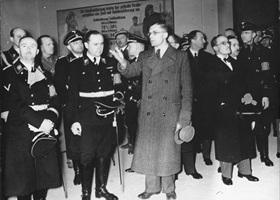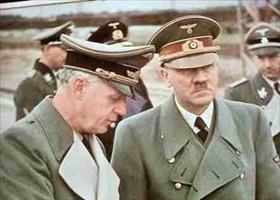HITLER TOLD EXIT POLAND OR FACE WAR
London, England and Paris, France · September 2, 1939
Shortly after British Prime Minister Neville Chamberlain and French Premier Édouard Daladier confirmed for themselves the German invasion of Poland on September 1, the two leaders gave the order for general mobilization and evacuation of children and mothers from their main cities. Both leaders also prepared to coordinate the delivery in Berlin of notes demanding German aggression against Poland be stopped and German troops promptly withdrawn. If the Germans could not provide assurance of that happening (there was no deadline), the British note concluded that the British government would fulfill its obligation under the terms of the Anglo-Polish military pact concluded the month before.
The British and French notes were handed late on the 1st to German Foreign Minister Joachim von Ribbentrop, who passed them on to his boss. Reading the notes Adolf Hitler could not determine if they were formal ultimatums or not. But on this date, September 2, Hitler decided that if the notes were ultimatums, then he would have nothing to do with an idea hastily floated in several European capitals, but mainly in Rome, of attending some sort of peace summit. Hitler said as much to Benito Mussolini the next day, adding that no conference was possible that devalued the “blood sacrifice” already made by German soldiers.
Near 8 o’clock on the evening of September 2, Chamberlain found the British House of Commons in an anxious and truculent mood due in part to the absence of a deadline that might compel German forces to leave Poland. The prime minister sensed that his government would collapse the next day unless the Allies imposed an early deadline for Germany’s withdrawal. Across the Channel Daladier, meeting with a friendlier audience in the French Chamber of Deputies, received a standing ovation when he ticked off French efforts to preserve the peace and underscored the necessity of honoring the West’s pledges to Poland. (Actually, Chamberlain could have boasted to Members of Parliament of his own efforts to negotiate a settlement satisfactory to all parties, along with repeatedly pledging Britain’s support to Poland, but his speech was ill-prepared, uninspiring, very short (four minutes), and late in a very long day; hence, the angry mood of some MPs.) Near midnight ministers in London and Paris finessed parallel ultimatums, to be delivered in Berlin at 9 a.m. on September 3, to expire later that day: Germany to halt the bloodshed by withdrawing its troops from Poland immediately or a state of war would exist between the three nations.
![]()
French Ambassador Delivers Ultimatum to German Foreign Minister
 |  |
Left: Between 1938 and 1939 Robert Coulondre was France’s dapper ambassador to Berlin, shown here with outstretched arm in 1939. (Reichsfuehrer-SS Heinrich Himmler is at left in the photograph.) It was Coulondre who, on the morning of September 3, handed German Foreign Minister Joachim von Ribbentrop his government’s ultimatum, worked out the night before with London, demanding Germany “suspend all aggressive action against Poland and to declare themselves ready promptly to withdraw their forces from Polish territory” or face the consequences. France gave the Germans till 5 p.m. to comply. Ribbentrop said icily, “Very well, France will be the aggressor,” to which Coulondre coolly replied: “History will be the judge of that.”
![]()
Right: Berlin’s diplomatic community thought Ribbentrop (shown here with Hitler) a “bumptious” (Coulondre’s words) person. Coulondre (1885–1959) and Sir Nevile Henderson (1882–1942), Britain’s ambassador to Berlin, remarked on Ribbentrop’s snubbing them in their dealings with the German Foreign Office. Both diplomats much preferred working with Ribbentrop’s deputy, State Secretary Baron Ernst von Weizsaecker, an ex-naval officer and the father of future German President Richard von Weizsaecker (in office 1984–1994).
Hitler’s Blitzkrieg Targets Poland, Then Western Europe the Next Year
![]()

 History buffs, there is good news! The Daily Chronicles of World War II is now available as an ebook for $4.99 on Amazon.com. Containing a year’s worth of dated entries from this website, the ebook brings the story of this tumultuous era to life in a compelling, authoritative, and succinct manner. Featuring inventive navigation aids, the ebook enables readers to instantly move forward or backward by month and date to different dated entries. Simple and elegant! Click
History buffs, there is good news! The Daily Chronicles of World War II is now available as an ebook for $4.99 on Amazon.com. Containing a year’s worth of dated entries from this website, the ebook brings the story of this tumultuous era to life in a compelling, authoritative, and succinct manner. Featuring inventive navigation aids, the ebook enables readers to instantly move forward or backward by month and date to different dated entries. Simple and elegant! Click 











